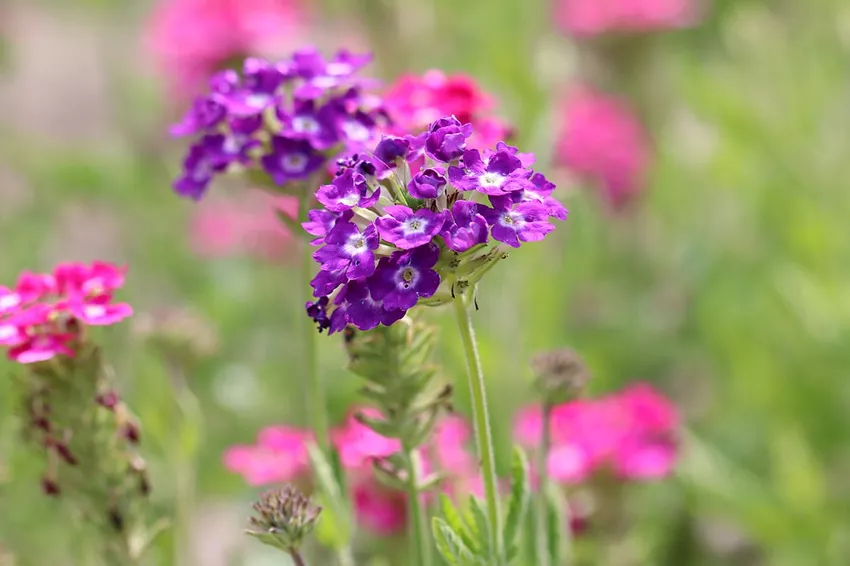- Different varieties
- demands of the plant
- Hibernating verbena - instructions
- New sowing
- frequently asked Questions

Flowering verbena are very popular on the balcony, terrace or in the garden. Easy-care and colorful, hobby gardeners rely on verbena. But is verbena also hardy?
In a nutshell
- Different species make different demands on the environment, temperature and more.
- Vervains prefer nutrient-rich soil and a sunny location
- Protective devices for frost-sensitive verbena are usually not sufficient in winter
- Transplant and winter well inside the house structure
Different varieties
Many gardeners make the mistake of generalizing. Because there are numerous variants of the iron herbs, which differ significantly in terms of their winter hardiness. Vervain (Verbena officinalis), for example, is a frost-hardy specimen that does not require special frost protection in winter. Consequently, this variety of verbena can easily overwinter outside. The following variants are also hardy:
 Lance Vervain (Verbena hastata), Source: 阿橋 HQ, 藍花馬鞭草 Verbena hastata -英格蘭 Wisley Gardens, England- (15050548086), Edited by Plantopedia, CC BY-SA 2.0
Lance Vervain (Verbena hastata), Source: 阿橋 HQ, 藍花馬鞭草 Verbena hastata -英格蘭 Wisley Gardens, England- (15050548086), Edited by Plantopedia, CC BY-SA 2.0
- Lance Vervain (Verbena hastata)
- Canadian Vervain (Verbena canadensis)
demands of the plant
Verbena is a popular garden plant that gives off a spicy scent in the garden. The plant is resistant and persistent. In order to thrive magnificently and permanently, the easy-care plant has different requirements. On the one hand, a sunny spot is recommended, while the plant also loves moisture. A nutrient-rich soil and fertilizing every 2 weeks also help ensure that the verbena herb remains stable.
Hibernating verbena - instructions
The situation is different with the frost-sensitive iron herbs. You have to overwinter these with a little more effort. This rarely works well outdoors, since leaves and twigs do not provide sufficient protection from the cold. The frost succeeds through the protective layer and destroys the plant. Consequently, you should proceed as follows when overwintering verbena:

- Cut back in autumn
- Set up the pot in a frost-free environment
- regular airing
- water evenly but little
- Transplant to the old site in May
New sowing
If you don't want to bother with transplanting, you can simply sow the seeds again. Verbena is a viable plant. When sowing, you should prefer the seeds at home. It is then possible to resettle in the bed.
Notice: Vervain seeds need a cold period to germinate at all. In the spring, the seeds can germinate and new plants grow.
frequently asked Questions
What should I consider when caring for me?Compared to other plants, verbena is relatively undemanding. The plant flowers constantly and is therefore ideal for hobby gardeners. In principle, it is sufficient to regularly add water and fertilizer to the plants. In the warm summer, the plants need up to 1.5 liters per day. Neither standing water nor dry soil are conducive to plant growth.
Where does verbena actually come from?The plant with the scientific name Verbena officinalis originally comes from the South American continent. Verbena herbs are now widespread all over the world. This is how the plant thrives in our region with proper care and humus-rich soil.
Which pests are a danger?Various pests threaten the plants. Aphids, spider mites and snails can destroy the most beautiful plants. Traditional varieties were susceptible to the disease powdery mildew, while the bred specimens are more resistant today.